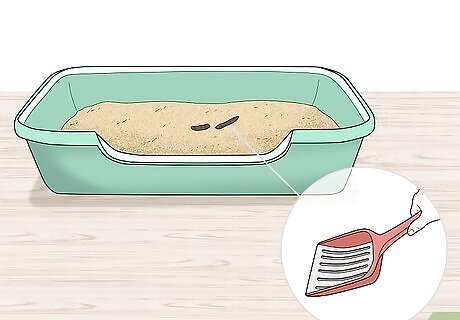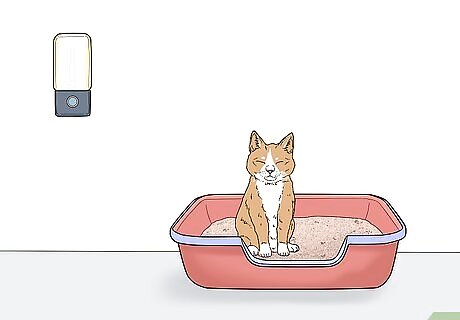
views
Cleaning Frequently

Clean the box daily. One of the best ways to keep the odor from your cat's litter box, from overtaking your home, is to clean the box daily. Get in the habit of scooping out feces and urine on a daily basis. Determine a set time to do this and make it a part of your daily routine. If you're not using litter that clumps, use a large, metal spoon to pull out the big wet spots as well. Place the contents in a plastic bag and immediately place them outside. Don't leave the dirty litter sitting in your trashcan, as this will also contribute to the smell.

Use baking soda. When you're cleaning out the litter box, consider using baking soda. While there are deodorizers available on the market, the smell may be offensive to cats. The baking soda will act as a deodorizer, without the artificial scent. Another benefit to baking soda is that it is inexpensive. You don't have to spend a lot of money on a deodorizing product.

Dispose of contents weekly. In addition to cleaning the litter box daily, make sure the box is emptied and cleaned on a weekly basis. Dump out all of the litter and wash the box with unscented soap and water. Make sure to wash the scoop or spoon you use as well. Let everything dry before refilling the box with litter. Don't overfill the box, keep the litter only 2-3 inches deep. This will make it easier for you to clean.

Get rid of the box yearly. To further prevent litter box odor from consuming your home, try to replace the box every year. Boxes become increasingly difficult to sanitize as the year wears on, due to scratch marks from your cat's claws. Consider donating the box to a local shelter if you feel uncomfortable about throwing it away.
Purchasing the Right Product

Have one more box than you have cats. Purchasing the right products is equally as important as cleaning, in the battle against smelly litter boxes. You'll need more than 1 litter box—a good rule of thumb is to have one box per cat plus one extra. Just like you, cats need some space of their own. More importantly, keeping a litter box clean that is being used by more than one animal will be extremely difficult. The reason for the extra box is that some cats are territorial and/or aggressive. If one of your cats is not allowing the other one to use the box, that cat will have to find somewhere else to go to the bathroom. In short, you could have a very messy and smelly situation on your hands!

Figure out what type of box to purchase. Although it may seem as if any type of box is acceptable, that isn't necessarily the case. You'll need to consider the type of material, as well as the size of the box. Plastic is the preferred material for litter boxes since it's easy to clean. In general, it's better to get a box that is at least twice the size of your cat. If you currently have a kitten, do your best to estimate how big he/she will be when they are grown. Purchasing a box that is covered may be off putting to your cat. These types of boxes trap smells inside, so if you're not good at cleaning the box on a daily basis, the smell may offend your cat. If the cat isn't able to use the box, they'll find another place around your home to do their business instead.

Consider natural litter. Though there isn't a perfect litter in terms of odor control, many of the natural litters have good reviews in this particular category. Amongst the top natural litter options - corn, wheat, pine, walnut and paper - all but paper received decent reviews for odor control. As with any type of litter though, none of them have a perfect track record of keeping the smell at bay. If you're uncertain as to which one will work best for your cat, try using different types in different boxes. For example, you may use walnut in one and pine in another. See which one the cat gravitates to. If the cat doesn't seem to have a preference for either, choose the one, which best covers the odor.
Finding a Good Spot

Find a room with good air flow. The last thing you want to do is to keep the litter box in a small, closed off room. The smell will not only deter the cat, but will force him/her to find another place to use the bathroom. It may be beneficial if the room has a window with a screen. That way, you're able to keep the room ventilated without fear of the cat getting out. During the summer months, be sure the room is at a comfortable temperature by using a fan or the air conditioning.

Keep it away from main areas. Rooms such as the kitchen or the main living room aren't recommended spots for the litter box. These are the rooms, which see the heaviest traffic and not only will your guests not want to witness your cat using the bathroom, but the cat won't be pleased by the company either. Try not to place the cat's litter box next to his/her food. This will only serve as a distraction for the cat. Find a space, which is near to where the cat spends the majority of its time, but at a distance from the main living area. You may want to place the box in a guest room or bathroom, which isn't frequently used. However, when guests come to stay, be aware that you will have to move the box, which may result in confusion for your cat.

Make sure there's enough light. Just like us, cats don't prefer to spend time in the dark. If they can't see where they're going to the bathroom, chances are you'll be left with a smelly mess to deal with. While it's true that cats are better equipped to deal with darkness, they still are unable to see in the pitch black. Older cats, in particular, struggle with seeing in the dark, so be sure the litter box is well lit even at night. Consider placing a night light close to the box so that cats can find it at all times.




















Comments
0 comment